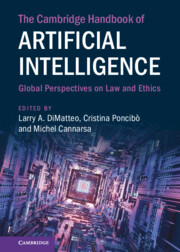Book contents
- The Cambridge Handbook of Artificial Intelligence
- The Cambridge Handbook of Artificial Intelligence
- Copyright page
- Contents
- Figures
- Contributors
- Foreword
- Preface
- Part I AI: Development and Trends
- Part II AI: Contracting and Corporate Law
- Part III AI and Liability
- Part IV AI and Physical Manifestations
- Part V AI and Intellectual Property Law
- Part VI Ethical Framework for AI
- 19 AI, Consumer Data Protection and Privacy
- 20 AI and Legal Personhood
- 21 AI, Ethics, and Law
- 22 Standardizing AI
- Part VII Future of AI
21 - AI, Ethics, and Law
A Way Forward
from Part VI - Ethical Framework for AI
Published online by Cambridge University Press: 28 July 2022
- The Cambridge Handbook of Artificial Intelligence
- The Cambridge Handbook of Artificial Intelligence
- Copyright page
- Contents
- Figures
- Contributors
- Foreword
- Preface
- Part I AI: Development and Trends
- Part II AI: Contracting and Corporate Law
- Part III AI and Liability
- Part IV AI and Physical Manifestations
- Part V AI and Intellectual Property Law
- Part VI Ethical Framework for AI
- 19 AI, Consumer Data Protection and Privacy
- 20 AI and Legal Personhood
- 21 AI, Ethics, and Law
- 22 Standardizing AI
- Part VII Future of AI
Summary
AI has profound ethical implications and poses grave threats to humanity, whereas a theoretical framework for determining what it can and cannot do or for what it should and should not do, has yet to be developed. That gap is understandable as applying ethics and law to AI is not easy and doing so raises deep philosophical problems. The result is a formidable strategic challenge. On one hand, we may make fundamental errors if we try to sidestep foundational issues to arrive at pragmatic solutions. On the other hand, we may get bogged down trying to solve those foundational issues. This chapter attempts to steer a middle course - addressing the deep problems while avoiding gratuitous philosophical commitments. In other words, the chapter attempts to confront philosophical issues to the extent - but only to the extent - necessary to chart a way forward. Human beings may have an ongoing role to play in supervising AI from ethical and legal perspectives, despite impressive technological advances. The chapter identifies key challenges for regulating AI and for AI as a legal regulator, sketching a general framework for understanding the relationship between AI, consciousness, ethics, and law.
Keywords
- Type
- Chapter
- Information
- The Cambridge Handbook of Artificial IntelligenceGlobal Perspectives on Law and Ethics, pp. 304 - 320Publisher: Cambridge University PressPrint publication year: 2022



